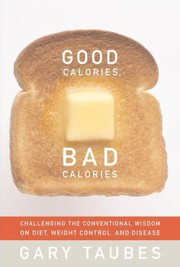Check nearby libraries
Buy this book

In this groundbreaking book, the result of seven years of research in every science connected with the impact of nutrition on health, award-winning science writer Gary Taubes shows us that almost everything we believe about the nature of a healthy diet is wrong. For decades we have been taught that fat is bad for us, carbohydrates better, and that the key to a healthy weight is eating less and exercising more. Yet with more and more people acting on this advice, we have seen unprecedented epidemics of obesity and diabetes. Taubes argues persuasively that the problem lies in refined carbohydrates (white flour, sugar, easily digested starches) via their dramatic effect on insulin, the hormone that regulates fat accumulation and that the key to good health is the kind of calories we take in, not the number. There are good calories, and bad ones. Taubes traces how the common assumption that carbohydrates are fattening was abandoned in the 1960s when fat and cholesterol were blamed for heart disease and then wrongly were seen as the causes of a host of other maladies, including cancer. He shows us how these unproven hypotheses were emphatically embraced by authorities in nutrition, public health, and clinical medicine, in spite of how well-conceived clinical trials have consistently refuted them. He also documents the dietary trials of carbohydrate-restriction, which consistently show that the fewer carbohydrates we consume, the leaner we will be. With precise references to the most significant existing clinical studies, he convinces us that there is no compelling scientific evidence demonstrating that saturated fat and cholesterol cause heart disease, that salt causes high blood pressure, and that fiber is a necessary part of a healthy diet. Based on the evidence that does exist, he leads us to conclude that the only healthy way to lose weight and remain lean is to eat fewer carbohydrates or to change the type of the carbohydrates we do eat, and, for some of us, perhaps to eat virtually none at all. Good Calories, Bad Calories is a tour de force of scientific investigation certain to redefine the ongoing debate about the foods we eat and their effects on our health. - Publisher.
Check nearby libraries
Buy this book

Previews available in: English
Subjects
Physiological effect, Reducing diets, Low-carbohydrate diet, Nutritionally induced diseases, Weight loss, Refined Carbohydrates, Health & Fitness, Medical, Nonfiction, Science, Diet, Carbohydrate-Restricted, Maladies d'origine nutritionnelle, Glucides raffinés, Dietary Carbohydrates, Perte de poids, Reducing Diet, Effets physiologiques, Régimes amaigrissants, Régimes hypoglucidiques, nyt:food-and-fitness=2015-03-08, New York Times bestseller, Weight LossShowing 4 featured editions. View all 4 editions?
| Edition | Availability |
|---|---|
|
1
Good Calories, Bad Calories: Fats, Carbs, and the Controversial Science of Diet and Health
Aug 01, 2011, Blackstone Audio, Inc.
audio cd
1455116750 9781455116751
|
zzzz
Libraries near you:
WorldCat
|
| 2 |
eeee
|
|
3
Good Calories, Bad Calories: challenging the conventional wisdom on diet, weight control, and disease
September 25, 2007, Alfred A. Knopf, Knopf
Hardcover
in English
1400040787 9781400040780
|
aaaa
Libraries near you:
WorldCat
|
|
4
Good Calories, Bad Calories
2007, Knopf Doubleday Publishing Group
Electronic resource
in English
0307267946 9780307267948
|
zzzz
Libraries near you:
WorldCat
|
Book Details
Published in
New York
Table of Contents
Classifications
The Physical Object
ID Numbers
Community Reviews (0)
Feedback?History
- Created April 29, 2008
- 18 revisions
Wikipedia citation
×CloseCopy and paste this code into your Wikipedia page. Need help?
| May 27, 2023 | Edited by MARC Bot | import existing book |
| March 8, 2023 | Edited by MARC Bot | import existing book |
| December 5, 2022 | Edited by ImportBot | import existing book |
| December 24, 2021 | Edited by ImportBot | import existing book |
| April 29, 2008 | Created by an anonymous user | Imported from amazon.com record. |













